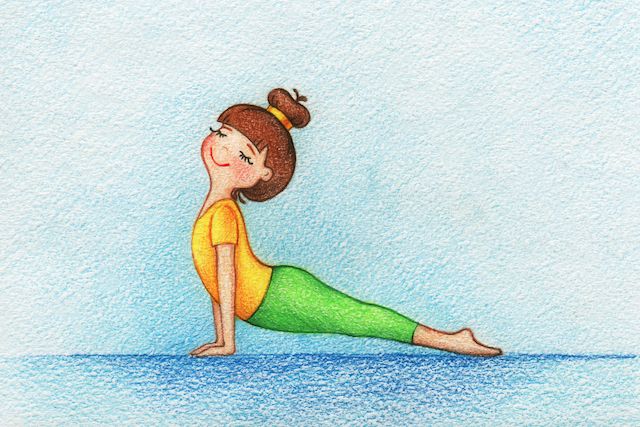
“Within you there is a stillness and a sanctuary to which you can retreat at any time and be yourself.” ~Hermann Hesse
As a child in ballet I was chastised for my inability to capture attitude or arabesque. With only one foot planted on the ground I reached for anything to prop myself up—the barre, the instructor, an unsuspecting fellow tutu-wearing classmate who would then lose balance herself.
My days at ballet were short lived, but my trouble balancing was not. This persisted for decades, through college and into the early years of my marriage.
Now I was no longer just hoping to stand steadily and gracefully on one foot, but instead was trying endlessly to balance hopes with expectations, mental energy with physical willingness, yearning and desire with fatigue and dread.
Fast-forward through my short-lived childhood aspirations of becoming a ballerina to my first yoga class. Walking into the classroom I instinctively stretched out my mat at the end of the room, right up against the wall. Without thinking about it I created a safety net to hold onto. In case of a fall, the wall would be right there. In case I lost my balance.
About midway through the practice my instructor set up a metaphor that stuck with me. “Your mat is your world, and you are here, present in the midst of it,” she said. “We all have areas of our life that need attention. Start applying that attention here and now.”
As she guided us into a new pose she concluded, “If you require strength, then push yourself harder. If you require peace, then take a deep breath.”
That is when I toppled over—as if on cue, and the wall didn’t catch me either. A sign could not have struck me more clearly. My mat is my world, and I need to find balance.
But the mat wasn’t actually my world, and outside of the yoga studio there were things calling to me. There were questions I had to answer, decisions I needed to make, people I had to talk to. With two feet planted firmly on the ground I was still in danger of losing balance.
This lack of balance stretched far beyond my physical abilities. It poured over into my personal life, academic endeavors, and career choices. Imbalance seemingly seeped into every action I attempted.
I developed an all-or-nothing mentality. I either had a calendar packed with things to do at every waking moment or I let every bit of it go and spent long days in bed, wondering if anyone would call. I was either overconfident in my abilities or completely unsure of myself; I felt loved or I felt hated.
This perpetual imbalance left me in a constant state of anxiety. I didn’t know what to expect out of myself. So I took a step back, evaluated the role I was playing in my own life, and I found my center.
In my journey to finding inner balance, I found that there are five fundamental changes I had to make:
1. Stop being busy.
Busyness isn’t a packed to-do list; it’s a mentality. If you want to be busy, things you love to do and even otherwise relaxing activities can grow overwhelming as you turn them into tasks.
Busyness can quickly become a mask to hide behind. I wanted people to think I was busy more than I wanted to do the tasks I had taken on. I let go of the need to be busy and learned to accept and appreciate downtime as space for self-development.
2. Learn when to let chances pass.
Opportunities knock, but not all of them are right for you. Job offers will come, friendships will be formed, and investments will be proposed. Not all of them need to be taken. There are things that I have thought I wanted, and when finally faced with the chance to act I felt more obligated than interested.
Continuing down this road isn’t helping anyone and is only going to drive you towards greater imbalance. Learn to cut your losses and listen to your gut.
3. Recognize external pressure.
Not every problem you face is your problem to solve. Friends, family members, and co-workers may inadvertently push their problems onto your shoulders to bear, but you do not need to accept it. External pressure can drive you to make decisions you aren’t comfortable with and can cause you to second-guess yourself.
Listen to yourself first, and reassert your personal control over your own actions.
If there was no pressure there would be no need for finding balance. Part of maintaining balance in your life is finding the will to continue in the face of pressure, and learning when it is okay to let it go.
4. Stop rushing.
I once grew pestered with my husband for taking so long to get ready for a day at the beach, and then became flustered by the traffic on our way there. He found it hilarious that I could grow so stressed in this situation. “Hurry up to wait” is what he called it, and he was right.
I created a deadline where there wasn’t one and forced my desire to rush onto him.
No one has the right to dictate how anyone else spends their time. You move at your own pace and I, at mine. We all have destinations we are striving to reach, whether they are physical, emotional, or even in our career.
There are things to learn along the way, so don’t rush the process.
5. Accept the present.
The past is loaded with anxiety and thoughts about things you should have or could have done. The future is packed with unknowns and ideals of what should happen. Constantly struggling between the past and future will leave anyone unbalanced.
The present is the center. To find balance you have to accept the moment you are living in now. The past has already played out, and the future will unravel as it comes. The time worth thinking about is now.
There are things in life that are going to knock you off your feet, and there are times that you are going to lose balance. Maintaining inner balance isn’t just learning how to stay grounded. It involves finding the strength to get back up after you fall and to try again.
About Jessica Margaret Fessenden
Jessica Margaret Fessenden, MA is a web content and freelance writer in Jacksonville, Florida. She enjoys writing, gardening and cooking, and keeps notes online of her thoughts on literature, feminism and mental and physical well-being at graduatebookshelf.com.













 Though I run this site, it is not mine. It's ours. It's not about me. It's about us. Your stories and your wisdom are just as meaningful as mine.
Though I run this site, it is not mine. It's ours. It's not about me. It's about us. Your stories and your wisdom are just as meaningful as mine.
This post really spoke to me. I suffer from anxiety, esp. #1 and #2. Thanks!
Excellent post! Living in the present seems so easy for some people, but for others like me who are always thinking about future possibilities, it’s hard to just stop and smell the roses. It seems like it’s a part of our culture, too. I will try to pay attention to your tips for creating balance in my life. Thanks. 🙂
I think you might be me! I love this, I currently feel anxious from trying to force ten years’ worth of decisions into two months and from being surrounded by people who’ve made those decisions. Like they say don’t compare your behind the scenes to everyone else’s highlights! Not sure how to sort all this out but knowing other people have been there makes you feel slightly better!
This was really affirming and helpful. Thank you. I will definitely be sharing your article.
This is just what I needed. As a twenty-two year old, I constantly think about what is right for me and my future. I feel that I am trying to perfect the uncertanties in my life–which I know isn’t realistic or possible. I know that life is all about balance– but finding that can send you off the deep end as you try to attain your faulty expectations.
I love that you classify “busy” as doing things that you enjoy–whereas I have always heard of it in a negative way–fulfilling obligations until they are done. My to-do list never actually gets checked off because I constantly set a new standard of what I should accomplish. Thank you for these enlightening words of wisdom!
Excellent narrative. I particularly appreciate the yoga analogy. I find that same analogy in the state-of-my-garden’s paralleling how my life is going. If one is in the weeds, the other is certain to be as well. There needs to be a balance in life, or we tend to careen out of control at some point or another. I could have observed my garden as a task to be completed or as a pastime that could, indeed, invite and complete numerous other goals I had. Rest, reflection, exercise, breathing in the outdoors…all appointed diversions needing their own space in time. Done in small consistent steps, each can be done leisurely, currently, opportunistically and pressure-free while keeping the weed count down. And…fulfilling all five of your steps. Heck, it also sets the stage for spontaneity. It takes the stress out of things that need to be done and none of them arise to rain on an improptu parade.
I’m so happy that my experience has resonated with other people! I remind myself daily that learning lessons like the ones I’ve outlined is only half of the battle. I still must push myself to practice these things daily. Knowing I am not alone is always so reassuring.
What I find difficult to fully agree with is that some people may interept the “be in the present” as a state of doing nothing and not try to advance their life in whatever way they feel is necessary to make it better. By acting now, they change then. If not now, then when? There are certainly people who feel that they are completely at the will of outside forces and are not capable of taking control of their own life for X reasons. (I’m not one of those people, but I know people who are.)
Enjoyed this wisdom–thanks!
Beautiful post! Thank you for sharing your experience, process of awareness, and insight! Great tips to put into practiceM! 🙂
The hardest part for me is not to control everything. That is what I believe that gives me balance and security, but it also brings me anxiety and fear…it is a big responsibility we take when we try to control everything, because when something, anything, doesn’t go “the way it should”, you can lose it, because you whole life was drawn to keep it on the track… I admit this is the biggest challenge for me and I must or should, try and accept to trust the “outsider”…
Thanks ,